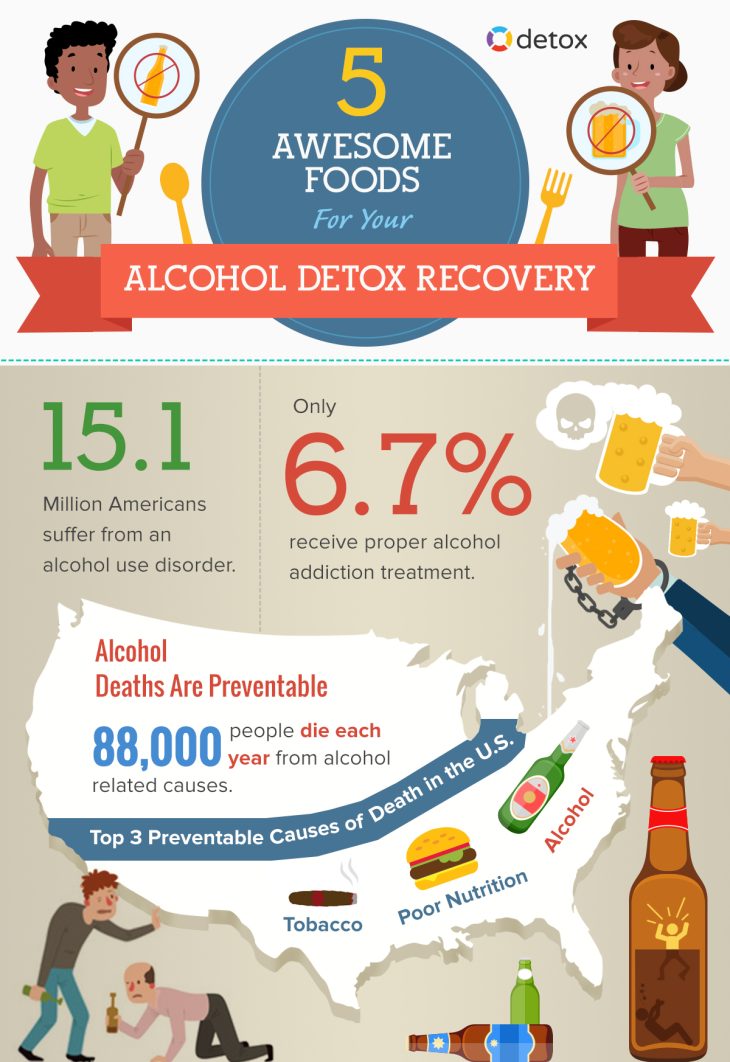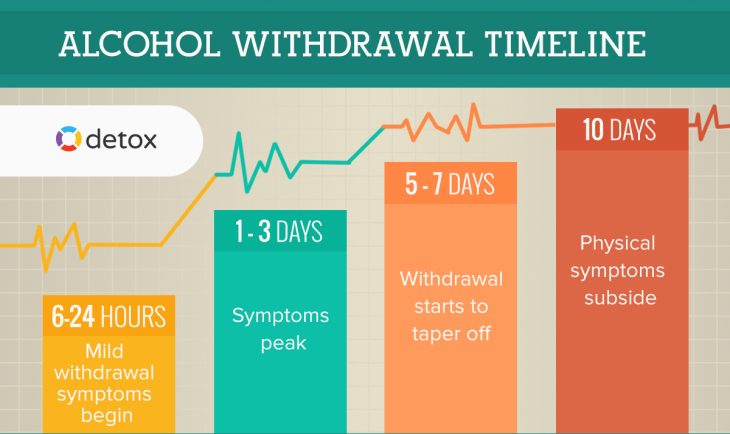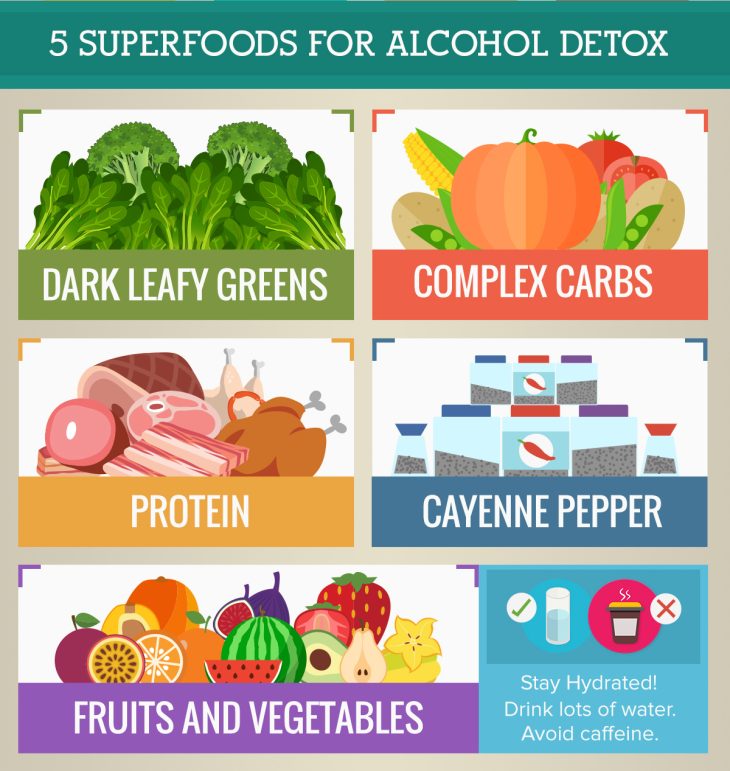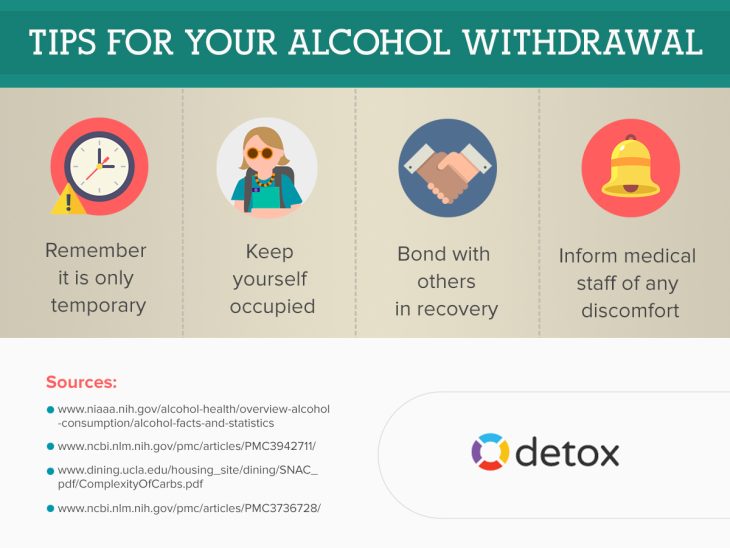Trusted Alcohol Detox Diet: 5 Superfoods for Your Recovery
Alcohol strongly affects the way your body metabolizes and uses certain nutrients. For instance, alcohol inhibits the body’s absorption of protein, healthy fats, and essential B vitamins — all of which are vital to maintaining a strong immune system and staving off illness and disease. When recovering from alcohol use disorder, it’s important that you provide your body with the nutrients it needs to heal and repair itself after having been dependent on alcohol.
Detoxing from alcohol is often the most challenging stage of overcoming alcohol addiction, or alcohol use disorder. Alcohol withdrawal symptoms can range from mild to severe depending on a person’s overall health status, and on the amount of alcohol they normally drink. While alcohol detox is one of the safest, most effective ways to overcome alcohol dependence, this treatment can cause some to feel sick and debilitated on behalf of symptoms such as fever, vomiting, and insomnia.
Modifying your diet to include healthier, nutritious foods is essential to achieving improved overall health and lasting sobriety when recovering from alcohol use disorder. Certain foods can boost your energy levels, reduce and relieve some withdrawal symptoms, and strengthen your immunity — all of which are key factors to overcoming alcohol use disorder both physically and psychologically. Evidence even shows that a healthy diet can help correct an imbalance in hunger hormones and eliminate alcohol cravings — a withdrawal symptom that commonly leads to relapse.
If you or a loved one is going through alcohol detox, understand that a healthy diet can enhance your recovery, and help you feel stronger, more refreshed, and more energetic.
Here’s what you need to know about alcohol detox and withdrawal along with a list of superfoods to include in your alcohol detox diet that may be effective at accelerating your recovery.

Alcohol Addiction and the Need for Detoxification
Those who are physically dependent on alcohol will consume a certain amount every day to keep withdrawal symptoms at bay. Someone who suddenly quits drinking, or who cuts back on their daily intake will experience a number of unpleasant symptoms as their bodies try to heal and rebalance after being dependent on alcohol. Nausea, headaches, and depression are just some common alcohol withdrawal symptoms that can be painful and difficult to deal with.
People who try quitting alcohol cold turkey, or who try at-home detox kits are often at greater risk for suffering a relapse, since these methods do nothing to address and relieve withdrawal symptoms. Those who are unable to physically and psychologically endure alcohol withdrawal often resume drinking shortly after quitting. A relapse can lead to alcohol poisoning, coma, and death, in severe cases.
Alcohol detox is the first stage of any alcohol addiction treatment, and must be completed before patients can move on to overcoming the root causes of their addiction with counseling and therapy. Alcohol detox treatments not only cleanse your body of alcohol and help you overcome dependency, but allow you get back on track with a healthier lifestyle. Diet and nutrition therapies are widely available at many alcohol detox centers to teach patients about foods that can keep them healthy and sober for the rest of their lives.
Alcohol Use Disorder in the United States
15.1 million U.S. adults suffer from alcohol use disorder, but only 6.7 percent receive detox and addiction treatment.
Historical data shows that alcohol use is associated with 88,000 deaths in the U.S. per year, and that men are more likely to abuse alcohol than women. In 2014, an estimated 31 percent of all driving fatalities in the U.S. were caused by alcohol-impaired driving.
Alcohol is the third leading preventable cause of death in the U.S., preceded by tobacco and a combination of poor nutrition and lack of exercise. Alcohol use disorder is even associated with 47 percent of all lung disease deaths, and 47.9 percent of all cirrhosis deaths. Heavy alcohol consumption greatly increases the risk for a number of cancers, including liver cancer, mouth cancer, and breast cancer.
Quitting drinking today can help you boost your immunity, and significantly lower your risk for these serious illnesses and diseases. The alcohol detox and withdrawal timeline is different for everyone based on their current health and addiction statuses.
You can overcome alcohol dependence; get the help you need today!
How Long Does it Take to Detox From Alcohol?
Alcohol withdrawal symptoms can begin as early as six hours after the last drink, or as late as 24 hours after the last drink. Symptoms are mild at first, and peak between days one and three. For most people, withdrawal symptoms begin tapering off between days five and seven, and often last no longer than 10 days.
Some may suffer a severe form of alcohol withdrawal called delirium tremens or DT, which is marked by dangerous symptoms such as confusion, hallucinations, and seizures. DT affects roughly three to five percent of those who go through alcohol withdrawal, and can lead to death without close medical supervision.
Following alcohol detox, some may continue to experience psychological symptoms such as depression, anxiety, and agitation. These symptoms can last for up to several months or years, and may require ongoing aftercare treatment following alcohol detox.

Alcohol Withdrawal Timeline
- First 24 hours: Symptoms are mild, and may include abdominal pain, nausea, vomiting, heart palpitations, shaking, loss of appetite, mood swings, insomnia, fatigue, and anxiety.
- Days 1 to 3: Mild symptoms worsen and peak during this stage. Additional symptoms may set in, and include sweating, hypertension, irregular heartbeat, confusion, fever, and irritability.
- Days 3 to 7: Physical symptoms begin tapering off around day five, and last no more than 10 days. Psychological symptoms may be present and ongoing, and include anxiety, depression, agitation, nightmares, mood swings, and irritability.
Tips to Help You With Alcohol Withdrawal
- Remember that withdrawal is only temporary. Alcohol detox often lasts between five and 10 days for most individuals. Though alcohol withdrawal may be painful or unpleasant at times, keep in mind that symptoms are temporary, and that your health will be greatly improved following detox.
- Keep yourself occupied during detox. Staying busy with activities during detox can distract you from any negative physical and psychological symptoms you may be experiencing. Entertain yourself with books, games, music, and other activities that can keep your mind off symptoms.
- Inform medical staff of any discomfort. Alcohol detox centers are staffed with caring and understanding medical staff who aim to ease your discomfort during withdrawal. If alcohol cravings or other withdrawal symptoms are interfering with your recovery, seek help from nurses, doctors, and counselors for medications and/or support.
- Bond with others in recovery. Some alcohol detox centers offer 12-step support groups and group counseling so you can network and bond with other patients in recovery who understand what you’re going through. This can help make detox and withdrawal more bearable, and provide you with insight into how others are managing their own recoveries.
Find out more about alcohol detox centers near you!
5 Superfoods for Your Alcohol Detox Diet
Superfoods are generally known as foods that carry a wide range of nutrition and health benefits. Superfoods are packed with vitamins, minerals, antioxidants, and other healthy compounds that strengthen the immune system, ward off illness and disease, and boost energy levels.
Here are the five best foods for alcohol detox.
1. Dark Leafy Greens
Dark leafy green vegetables are high in folate, also known as vitamin B9. Alcohol use depletes the body’s levels of B9, but eating dark leafy greens helps prevent the onset of anemia, which is common in those who suffer alcohol use disorder. Dark leafy greens are also loaded with antioxidants that fight off free radicals, and are high in fiber, calcium, iron, vitamin C, and vitamin K.
Leafy greens to include in your alcohol detox diet:
- Kale
- Romaine lettuce
- Green leaf lettuce
- Spinach
- Collard greens
- Arugula
- Swiss chard
- Chicory
- Bok choy
Replace iceberg lettuce in salads with a variety of the above leafy greens, which are far more nutrient-dense than iceberg varieties. Dark leafy greens can also be added to stir-fry meals and blended into fruit smoothies.
2. Complex Carbs
Complex carbs are high in fiber and healthy, natural sugars that boost your energy levels and promote good digestion. Fatigue and low energy are common alcohol withdrawal symptoms, but complex carbs help fight and reverse these symptoms. Since complex carbs are high in fiber, your digestive system works harder to break down these foods, which boosts metabolism and helps you flush alcohol more quickly from your system in the form of waste.
Complex carbs are not to be confused with simple, refined carbs, which are often packed with sugar and offer little to no nutritional benefits. Complex carbs are present in whole foods like fruits and vegetables, while simple carbs are often processed and made with sugar and flour, such as breads, pastries, and breakfast cereals.
Complex carbs to include in your alcohol detox diet:
- Beans
- Lentils
- Peas
- Sweet potatoes
- Pumpkin
- Whole grains
Prepare peas, sweet potatoes, and pumpkin in a steamer to retain the nutrients in these foods, or make vegetable chilis with a variety of beans. When consuming breads and pastas, stick to brands made with whole grains.

3. Colorful Fruits and Vegetables
Bright, colorful fruits and vegetables like red and yellow peppers, blueberries, and oranges are high in carotenoids — pigments that give these foods their vibrant hues. Carotenoids act as antioxidants that fight free radicals, including alcohol toxins. A diet high in colorful fruits and veggies can flush alcohol from your body more quickly, and provide you with countless nutrients that can accelerate your recovery.
Vibrant fruits and veggies to include in your detox diet:
- Mangoes
- Papayas
- Bell peppers
- Cherries
- Raspberries
- Blueberries
- Strawberries
- Oranges
- Pineapple
- Tomatoes
- Carrots
- Apricots
4. Protein
Protein boosts your energy levels and enhances your body’s ability to absorb certain vitamins and minerals. Protein is important for those whose bodies can no longer absorb nutrients on behalf of alcohol use disorder. Protein also helps boost memory, concentration, and mental clarity that may also be inhibited by alcohol use.
Here are healthy, high-protein foods to eat during alcohol detox:
- Beef
- Chicken
- Turkey
- Fish
- Eggs
- Black beans
- Greek yogurt
- Almonds
Toll-free
800-671-4304
Call Now
5. Cayenne Pepper
This flavorful spice has been used for food and medicinal purposes around the world for thousands of years, and offers countless health benefits for those going through alcohol withdrawal. As one of the best foods for alcohol detox, cayenne pepper helps ease nausea, abdominal pain, headaches, and many other alcohol withdrawal symptoms. Cayenne pepper also widens blood vessels to improve blood flow and circulation, which speeds up digestion and the body’s overall recovery process.
This spice is high in fiber, protein, potassium, manganese, folate, and vitamins A, C, E, and K. Buy fresh cayenne peppers whenever possible, since fresh, whole peppers are often more nutrient-dense than dried peppers or ground cayenne seasoning. Add cayenne peppers to soups, stews, and sauces, or sprinkle the seasoning over your favorite dishes.
Stay hydrated while going through alcohol detox by drinking plenty of water. Water helps flush toxins from your body in the form of waste, and can help offset fluids lost during withdrawal in the form of sweating, vomiting, and diarrhea. Avoid heavily caffeinated beverages like coffee, sodas, and dark teas, since these drinks may worsen dehydration when going through alcohol withdrawal.
Alcohol Detox Programs
Alcohol detox can be conducted in an inpatient or outpatient setting, though inpatient care is generally recommended for those with alcohol use disorder on behalf of DT and other possible complications associated with withdrawal. At inpatient detox centers, you or your loved one can be monitored around the clock by medical staff who can treat your symptoms and lower the risk for complications like dehydration and seizures. Inpatient detox centers usually offer additional therapies like support-group therapy, cognitive-behavioral therapy, and individual and group counseling to help patients overcome mental root causes of alcohol use disorder.

An inpatient medical detox often involves the use of medications that greatly reduce alcohol withdrawal symptoms, or that prevent the onset of alcohol cravings. Some detox centers even offer nutritional therapy so you or your loved one can consume superfoods to complement alcohol detox treatment. Nutritional therapy teaches you how to maintain a healthy, nutritious diet that promotes optimal mental and physical health, and that reduces your risk for relapse.
If you or your loved one is suffering alcohol use disorder, understand that professional help is available and nearby. Call 800-996-6135 today to learn more about your treatment options.

